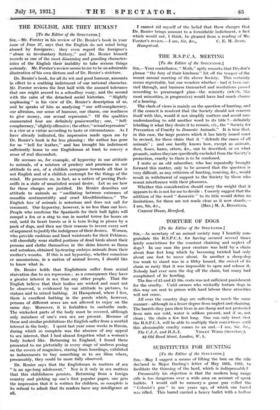THE ENGLISH, ARE THEY HUMAN?
[To the Editor of the SPECTATOR.] SIR,—Mr. Forster in his review of Dr. Renier's book in your issue of June 27, says that the English do not mind being abused by foreigners ; they even regard the foreigner's " abuse as involuntary flattery," and Dr. Renier himself _ records as one of the most disarming and puzzling character- istics of the English their inability to take serious things seriously. Mr. Forster's review seems to me to be an admirable illustration of his own dictum and of Dr. Renier's stricture.
Dr. Renier's book, for all its wit and good humour, amounts in effect to a scathing indictment of our national character. Mr. Forster reviews the first half with the amused tolerance that one might accord to a schoolboy essay, and the second with the calm of the detached social historian. " Slightly unpleasing " is his view of Dr. Renier's description of us, and he speaks of him as analysing " our self-complacency, our altruism, our sense of humour, our charm, our readiness to give money, our sexual repression." Of the qualities enumerated four are definitely praiseworthy; one, " Self- complacency," slightly offensive; the other," sexual repression" is a vice or a virtue according to taste or circumstance. As I have already indicated, the impression made upon me by Dr. Renier's book is far less pleasing ; the author has gone for us " hell for leather," and has brought his indictment sufficiently home to one Englishman at least_ to convey a sense of real discomfort.
He accuses us, for example, of hypocrisy in our attitude to animals, of a mixture of prudery and prurience in our attitude to sex, of a childish arrogance towards all that is not English and of a childish contempt for the things of the mind. He presents us, in fact, as a nation of peering Peck- sniffs in a state of unsatisfied sexual desire. Let us see how far these charges are justified. Dr. Renier describes our attitude to animals as " oscillating between- extremes of maudlin sentimentality and cruel bloodthirstiness." The English love of animals is notorious and does not call for comment. Our hypocrisy, however, is no less than our love. People who condemn the Spaniards for their bull fights will compel a fox or a stag to-run in mortal terror for hours on end, until its heart bursts or it is torn living in pieces by a pack of dogs, and then use their reasons to invent every sort of argument to justify the indulgence of their desires. Women, who provide cushions and lined waistcoats for their Pekinese, will cheerfully wear stuffed portions of dead birds about their persons and clothe themselves in the skins known as llama and astrakan, obtained by embryo animals from their mother's wombs. If this is not hypocrisy, whether conscious or unconscious, in a nation of animal lovers, I should like to know what is.
Dr. Renier holds that Englishmen suffer from sexual starvation due to sex repression ; as a consequence they have a greater interest in sex than any other people. That the English believe that their bodies are wicked and must not be observed, is evidenced by our attitude to pictures, to statues and to mixed bathing. At Hampstead, where I live, there is excellent bathing in the ponds which, however, persons of different sexes are not allowed to enjoy on the same day. Moreover, it is forbidden to sunbathe nude. The wickedest parts of the body must be covered, although only members of one's own sex are present. Because of these and similar prohibitions the English suffer from a morbid interest in the body. I spent last year some weeks in Russia, during which so complete was the absence of any appeal to sex interest, that I had almost forgotten what a woman's body looked like. Returning to England, I found them presented to me pictorially in every stage of undress posing on the covers of magazines, staring from hoardings, exhibited as inducements to buy something or to see films where, presumably, they could be more fully observed.
' Dr. Renier says that the Englishman in matters of sex " is an age-long adolescent." Nor is it only in sex matters that this childishness persists. Returning from a foreign country and picking up one's first popular paper, one gets the impression that it is written for children, so complete is its refusal to admit that its readers have any intelligence at all. I cannot rid myself of the belief that these charges that Dr. Renier brings amount to a formidable indictment, a fact which would not, I think, be gleaned from a reading of Mr.
Forster's review.—I am, Sir, &c., C. E. M. Jonas. Hampstead.


































 Previous page
Previous page